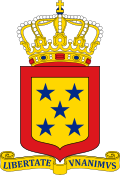Parliament of the Netherlands Antilles Staten van de Nederlandse Antillen Parlamento di Antias Hulandes | |
|---|---|
 | |
| History | |
| Founded | 5 April 1938 |
| Disbanded | 10 October 2010 |
| Preceded by | Colonial Council of Curaçao and Dependencies |
| Succeeded by | Parliament of Aruba Parliament of Curaçao Parliament of Sint Maarten States General of the Netherlands |
| Seats | 15 (1938–1949) 21 (1949–1950) 22 (1950–2010) |
| Elections | |
Last election | 22 January 2010 |
| Motto | |
| Cum lege libertas (Latin) "With the law there is freedom" | |
| Meeting place | |
 | |
| Statengebouw, Wilhelminaplein, Willemstad | |
 |
|---|
The Parliament of the Netherlands Antilles (Dutch : Staten van de Nederlandse Antillen; Papiamento : Parlamento di Antias Hulandes), also translated as the Estates of the Netherlands Antilles, was the parliament of the Netherlands Antilles. It comprised 22 members, elected for a four-year term in three multi-seat constituencies and two single-seat constituencies. [1] On 10 October 2010, the Netherlands Antilles were dissolved, and so was the parliament. [2]